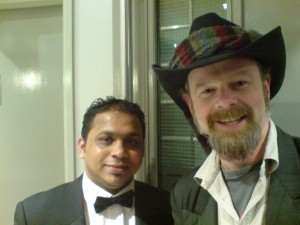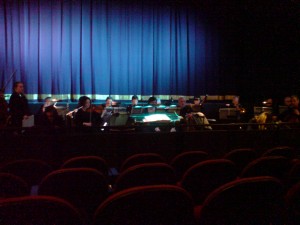So, the first thing I did upon arriving at the theatre was to ask the impeccably dressed doorman as I handed him my ticket stub if I could see the manageress. She came out and we had a brief friendly word before I thanked her, had a picture taken with said doorman, and she went back off to whichever unseen boudoir she’d emerged from. This opening paragraph has absolutely no bearing on the rest of this piece of writing, but I’ve mentioned it because it will have a direct influence on another item on The List when I come to do it in May. So bear it in mind that you’ve read it now and then dismiss it all you like and carry on reading. It will be important later, but not now.
So where was I? Oh, yeah.
Once she’d gone, I strode determinedly, cowboy hat and boots in full flight, through the theatre foyer, noting the distasteful looks from the other opera buffs and came to settle on the edge of the bar, whereby I promptly remembered I was in the middle of a Dry Month, grunted at the confused barman, and made my way through the door and down the theatre steps to find my seat.
Now, I’m no expert on opera – you can probably tell, given that you’re reading this here in the first place – but I know what I like, and if it doesn’t involve direct sudden blood loss, I’m liking it. I was here to see Verdi’s La Traviata, and despite teaching music for time immemorial, this was the first time I’d ever been to the opera. I bought a program from a bespectacled lady inside the door, in the hopes of later discovering what the hell was going on, and moved along.
And so ‘twas thusly that I took my seat, removed my hat when the lights went down, and sat enthralled for the next hour or so.
Let’s have a brief, ungoogled guide to opera at this point. People regard operas as tending to be earnest, highbrow affairs with many technical terms and foibles that would need a Haynes manual, so I reckon a quick explanation’s in order to dispel these myths.
The lead actress tends to be a Soprano, or a Mezzo – Soprano, which means she gets to sing all the high notes. She’ll usually get to do one extended passage on her own, which is known as an Aria, and they can go on for while, but you won’t notice how long because you’ll be so enthralled as to how another human being can do what she’s doing. Trust me, it can take your breath away.
The gents tend to be Romantic leads or supporting roles to the lead actress, and they’re either Tenors or Baritones – Tenors sing in a lower register, Baritones even lower. It all conspires with the orchestra to provide stunning harmonies – when the violins are playing a line, the clarinets and oboes the same but at a different pitch, and the main voices again playing different pitches, the sheer force of the harmony feels like it could strip paint. And it’s brilliant to watch. At the end of (a really brief) Act one, I was aware I hadn’t breathed in about two minutes, and I did the same in Act Two, only for longer.
Occasionally, one of the instruments of the orchestra will get a really fast and complicated part to play where everyone else will fade out and let them take the limelight. These are called Cadenzas, but they tend to occur in Concertos rather than operas, so we’ll not make a mention of ‘em here.
The orchestra themselves sit in a pit in front of the stage, start filtering in in dribs and drabs about half an hour before the action begins, tune up a bit, and spend a while waving at their mates and sweethearts in the audience before getting down to the serious business of playing the music that’s on their sheets. They’ll usually play an overture, which is like the general theme of the opera (like the Star Wars theme as the yellow writing crawls up the screen), before the curtain rises and the cast begin to sing. When that happens, it’s magic. Pure magic.
Anyway, Act one of La Traviata’s known for being pretty brief, so they shoehorned the first scene of Act two in before we had an interval and everyone broke for the bar.
It was a far cry from the army of port – quaffing Niles Cranes that I expected, but still they gave me the wide eyes and an even wider berth. I sensed the blue jeans, hat and boots were the source of unspoken consternation, but smiled and nodded my way through the crowded bar until I found myself outside in the smoking area. Where no one was smoking.
Fair enough, every cowboy rides alone and all that, and making a mental note to acquire a sidekick at the earliest opportunity, I sauntered out onto the terrace to take in some air. It had been several days now since I’d had a packet of cigarettes in my shirt pocket and I missed the familiar bulge. I tried popping my phone, my notebook, and even The List in there, but they didn’t replace the old familiar feeling, so I sucked on a biro for a while and watched the waning moon poke through the clouds over the starlit rooftops of the city. Then I headed back inside for act two.
The woman in the seat next to me was fiddling around attempting to get comfy, trying to rest her knees on the seat in front so they didn’t slip down.
“Tell you what, I will if you will” quoth I, happy to get the word quoth into my blog again for the second consecutive entry, and we both swung our legs over into the empty seats in front. Job done, we nodded to one another in complicity and went back to scouring through our programs.
The lights faded, the orchestra struck up some gentle easing notes, and she swung her legs back to rest on them against the chair. I tried to do likewise, but was stuck. What the hell, I wasn’t gonna raffle about in my chair and cause a scene, so I spent the rest of the performance with my legs hanging over the seat in front. I popped my jacket over them and my hat on top, in the hopes that anyone watching would think I was sitting behind a tiny person.
In my left pocket sat the Classic Fm layman’s guide to opera, and I admit that I possessed a modicum of disappointment that the words being sung (or Libretto, if you want the correct term) were in English – I was looking forward to hearing an opera in its original Italian, concentrating on the music, and letting my mind fill in the blanks. The power of your imagination’s the best aphrodisiac, after all, kids. Still, it was stirring stuff – lots of Florid Decoration from the lead actress (like when Mariah Carey goes up and down the scale, singing 20 notes when just the one will do), but I loved it, and was moved a great deal.
They say that opera buffs tend to prefer either Verdi or Wagner, and I can see why. The latter might well have been a moody Nazi prototype, but he did write some very heavy rousing music, and I think, of the two, I’d like to see some of his work next time. Verdi, to me, while impressive, felt a little “light” and I was waiting for big ass booming timpani and a million vengeful strings.
At the conclusion I clapped along with the best of ‘em until my hands hurt, and went on clapping until the conductor had buggered off for the second time and the curtain came down. Then I retrieved my hat, my jacket and my legs, mooched back up the stairs, tipped my hat to the manageress, and wandered out into the chilly March night. The moon was now lower, without a cloud in sight, and I followed it all the way to my little red door, in the shadow of the stooping tree.


